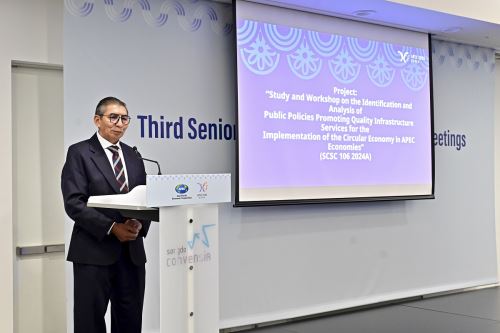00:30 | Incheon (South Korea), Aug. 5.
Peru, through the
National Institute of Quality (Inacal), led an international workshop in South Korea to strengthen the implementation of circular economy models in
Asia-Pacific Economic Cooperation (APEC) member economies.
Inacal —an agency attached to the Ministry of Production— led the workshop —supported by APEC— which aims to promote the strategic use of quality infrastructure.
The event was held on August 3 in the city of Incheon as part of the project "Study and Workshop on the Identification and Analysis of Public Policies Promoting Quality Infrastructure Services for the Implementation of Circular Economy in APEC Economies." It brought together representatives from 11 APEC member economies.
During the meeting, the progress of the study led by Inacal's Economic Studies Office and funded by APEC was presented, highlighting the fundamental role of technical standards, metrology, accreditation, and conformity assessment as tools to facilitate the transition toward more sustainable production models.

Peru as regional technical coordinator
The workshop also served as a platform to exchange successful experiences from economies such as Thailand, China, Mexico, and Peru itself.
This enriched the collective analysis and enabled the identification of public policies aligned with the Sustainable Development Goals, focused on reducing waste, maximizing resource reuse, and adapting quality systems to current environmental and productive challenges.
In a global context of transition toward more resilient and sustainable economies, Quality Infrastructure positions itself as a key enabler of the circular economy.
The standardization of processes, product traceability through metrology services, and certification of sustainable practices are essential to ensure countries' competitiveness in environmentally responsible global value chains.
From this perspective, Peru aims to consolidate its National Quality System as a driver of productive transformation, promoting principles of circularity in strategic sectors such as industry, agriculture, mining, and manufacturing.
The results of the Incheon workshop will serve as input for the preparation of a regional technical report, which will include key findings, common challenges, best practices, and policy recommendations.
This document will be aimed at strengthening the technical capacities of public policymakers and specialists involved in the circular economy within the APEC bloc.
Thanks to the promotion of initiatives like this, Peru continues strengthening its commitment to a sustainable development agenda based on innovation, quality, and international cooperation, reaffirming its role as a technical benchmark in the Asia-Pacific region.
21 leading economies
APEC is made up of:
Australia, Brunei Darussalam, Canada, Chile, People's Republic of China, Hong Kong, Indonesia, Japan, Republic of Korea, Malaysia, Mexico, New Zealand, Papua New Guinea, Peru, the Philippines, the Russian Federation, Singapore, Chinese Taipei, Thailand, the United States, and Viet Nam.
(END) NDP/MDV/MVB
Published: 8/5/2025